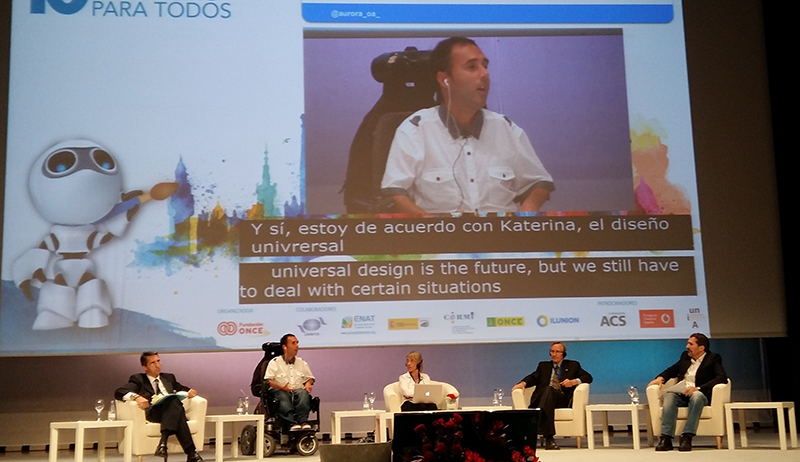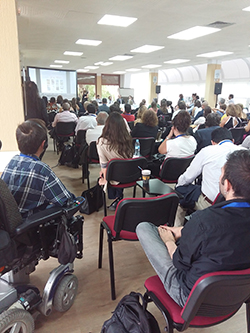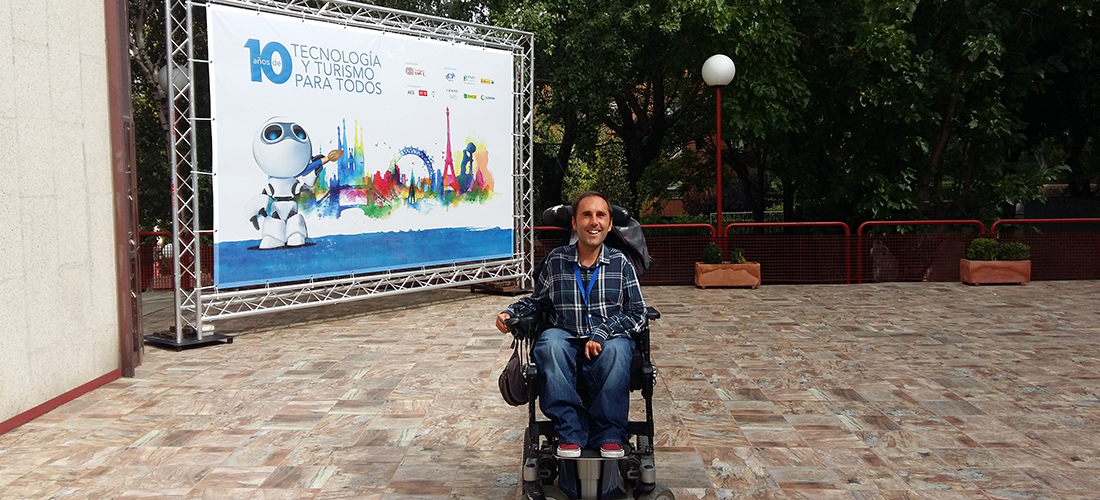Last week I was invited to Madrid by the huge national Spanish Charity, Once. They are funded from the sales of lottery tickets, and run many projects for disabled people. Their staff and board of trustees are heavily represented by disabled people which I applaud.
The conference was to celebrate technology and tourism in the disability world. It has been running for 10 years. People come to speak on panels, run workshops and share their work. Others come to watch, listen and learn. Some do all of the above.
My direct participation was in attending a panel discussion on the third and final morning about the sharing economy in tourism. I had to wear a lapel microphone, an earphone for translating the Spanish speakers, and I arranged a video to play behind me of Srin and my adventures. Very high tech hey.
The moderator was travel editor Andrés Fernández from national Spanish newspaper EL PAÍS. He interviewed myself a 4 other people; Ivor Ambrose, Managing Director ENAT (European Network of Accessible Tourism). Katerina Papamichail, Architect from ENAT. Martin Heng, Lonely Planet’s Accessible Travel Manager. Francisco Javier Aragón from Camilo José Cela University.
 Ivor represents and works with the supply side of tourism and to help them be more accessible. Alongside Katarina and her architect knowledge; they’ve pushed and pulled the sector to be far more accessible. Martin and I are disabled, and we run publications to encourage our peers to use these new travel opportunities. We all knew each other already and constantly support each other.
Ivor represents and works with the supply side of tourism and to help them be more accessible. Alongside Katarina and her architect knowledge; they’ve pushed and pulled the sector to be far more accessible. Martin and I are disabled, and we run publications to encourage our peers to use these new travel opportunities. We all knew each other already and constantly support each other.
I didn’t know much about the other guy from the university. Francisco surprised me when he started talking about the need for regulation on projects like our startup company Accomable (www.accomable.com). His points had merit regarding tourisms consumers/businesses having the same rights and responsibilities everywhere. However my perspective was that to regulate Accomable like a large business (with huge insurance policies etc), we’d go bankrupt.
Over regulation stifles innovation.
This is particularly counter productive when the market for disabled people is already failing. We need more suppliers to be accessible. We need those that are accessible to shout about out it. We need hubs like Lonely Planet, Disability Horizons and Accomable to bring both sides together. Millions of disabled people in the world can and want to travel. They just need the access and the information.
Needless to say it was a very interesting debate with such high esteemed people. Francisco and I shook hands afterwards and agreed that the answer is of course balance of regulation and innovation.
 Throughout the rest of the conference I learned about amazing new technologies and how they can help disabled people. For example one company want to use the technology of driverless cars on wheelchairs. It’s astounding what is going on out there.
Throughout the rest of the conference I learned about amazing new technologies and how they can help disabled people. For example one company want to use the technology of driverless cars on wheelchairs. It’s astounding what is going on out there.
Most of all I enjoyed meeting the different people there. It was surprising how many international people read my blog. I was very happy with the feedback. As always, great collaboration leads to great impact. So I’m hoping to work more with old and new friends as a result of this fantastic conference.
A big thanks to Once, Viajes2001 and Accessible Madrid for arranging our trip. The hotel, hoist and transport was very accessible.
In a few days I’ll share the story of Kasia and I seeing the real sites of Madrid. Plus after that I want to share a thought leadership piece on accessible air travel.
Martyn
World Changing Blogger | Twitter | Linked In | Google+
Co Editor Disability Horizons
Co Founder Accomable



